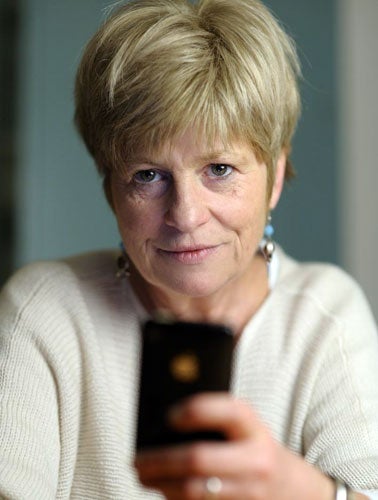Lost the news? There's an app for that...
System meltdown forces BBC presenter to read the headlines from her iPhone

Your support helps us to tell the story
From reproductive rights to climate change to Big Tech, The Independent is on the ground when the story is developing. Whether it's investigating the financials of Elon Musk's pro-Trump PAC or producing our latest documentary, 'The A Word', which shines a light on the American women fighting for reproductive rights, we know how important it is to parse out the facts from the messaging.
At such a critical moment in US history, we need reporters on the ground. Your donation allows us to keep sending journalists to speak to both sides of the story.
The Independent is trusted by Americans across the entire political spectrum. And unlike many other quality news outlets, we choose not to lock Americans out of our reporting and analysis with paywalls. We believe quality journalism should be available to everyone, paid for by those who can afford it.
Your support makes all the difference.Here is the news... by iPhone. A BBC Radio 3 newsreader was forced to read the morning headlines from her mobile phone after the Corporation's telephone and computer system crashed as she was about to go on air.
The cool actions of experienced newsreader Alison Rooper, who has frequently presented the news on Radio 4's Today programme and the World Service, meant that listeners were unaware of the glitch, although colleagues are fuming at the latest flaws in the BBC's technology.
Rooper had arrived at Broadcasting House at 6.15am on Wednesday expecting to present the hourly bulletins as normal on Rob Cowan's Radio 3 breakfast show. But as she went in search of coffee she encountered a BBC engineer who "warned me that everything had gone and that Television Centre was in rather a state". Across the BBC, particularly on the radio networks, something approaching panic was setting in as phones had stopped ringing and computers had gone down. Staff tried to send scripts to colleagues in other buildings by fax.
As the clock ticked towards 7am, Rooper was starting to worry. "I went into the studio at 6.45am and there was no script. I tried to call Television Centre but their telephone lines were down and they couldn't hear me," she said. Rooper managed to obtain an external number and contacted BBC News colleague Rachel Bulkeley on the summaries desk, who promised to send the scripts once more to another printer. Still nothing came through.
"She said, 'the only way I can think to get the script to you is by email,' but I said, 'no, you can't because our computers are down, we have no email and no computers,'" said Rooper, who suggested that the material be sent to her phone instead. "Rachel said, 'you can't possibly read a script off an iPhone,' but I told her, 'it's either that or we have no news, so let's try it.'"
Rooper says she is "married" to her iPhone, on which she has "more than five pages of apps". She also has more than 20 years of newsreading experience, and so calmly settled behind the microphone with her mobile in front of her instead of the usual printed sheet, and read out her opening headline on the introduction into schools of lessons in combating domestic violence.
"The words were reasonably clear on my iPhone screen," she said. "But I tried tipping the phone sideways so that the writing becomes bigger and then I lost the whole sentence. You need to read ahead all the time when you are reading out news. I had to tip it back to the right position and just scroll through very quickly with my finger, hoping to God I didn't do something accidentally. My heart was in my mouth but you have to take a deep breath and plunge in."
Join our commenting forum
Join thought-provoking conversations, follow other Independent readers and see their replies
Comments